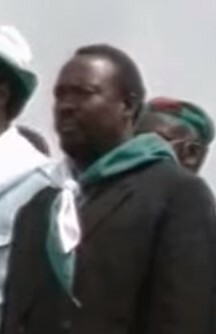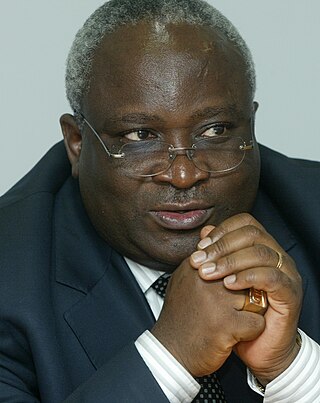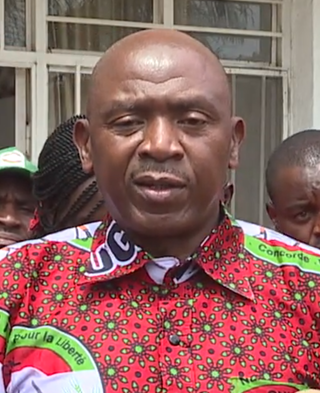| |||||||||||||||||
| |||||||||||||||||
| |||||||||||||||||
 |
|---|
Presidential elections were held in Burundi on 28 June 2010. As a result of withdrawals and alleged fraud and intimidation, incumbent President Pierre Nkurunziza was the only candidate.
| |||||||||||||||||
| |||||||||||||||||
| |||||||||||||||||
 |
|---|
Presidential elections were held in Burundi on 28 June 2010. As a result of withdrawals and alleged fraud and intimidation, incumbent President Pierre Nkurunziza was the only candidate.
Although the previous presidential election in 2005 had been carried out by the Parliament, the 2010 elections were direct. In early March 2010, the run-up to the election was described as "explosive" due to a combination of demobilized former combatants and violence between youth activists in the ruling CNDD-FDD and opposition FRODEBU. [1]
Following the Burundi Civil War, between the Tutsi and Hutu (similar to Rwanda), the National Liberation Forces (FNL) were brought into the legal political sphere and were said to be the incumbent Pierre Nkurunziza's most viable opposition. However, as a result of a campaign of intimidation in the run up to the vote, as well as alleging fraud in earlier local elections, all the other candidates withdrew from the ballot leaving only Nkurunziza. [2] On 1 June 2010, five opposition candidates, including Agathon Rwasa, who was considered the strongest contender, withdrew from the elections, alleging that the government intended to rig it. [3]
Following further similarities with Rwanda, ethnic tensions between Tutsi and Hutu were seen in the lead up to the Rwandan presidential election in the same year. Bombings there were blamed on the Interhamwe.
The day before the election three grenade attacks were reported in the early hours of the morning. Two attacks in the Buyenzi and Kamesa districts of Bujumbura caused no injuries, but an explosion in the western town of Kanyosha killed one person and wounded two. The person killed was reportedly an FNL official. Another man was shot dead in Bujumbaura's Musanga neighbourhood in a suspected politically motivated attack. [4] On election day, three more grenade attacks occurred in Bujumbura, while two more exploded in the north of the country. In all, at least eight people were killed and more than 60 wounded after the opposition candidates pulled out of the elections. [5]
The FNL were suspected of being behind the grenade attacks, with local police searching the home of party leader Agathon Rwasa. However, the FNL denied involvement in the attacks and claimed Rwasa was being targeted for political reasons. According to Alexis Sinduhije, chairman of the Movement for Solidarity and Development, police also arrested six members of his party. [5]
The East African Community – comprising Burundi, Rwanda, Kenya, Uganda and Tanzania – urged all parties to ensure a smooth and democratic election. [5]
In the FNL bastion of Kanyosha, only a handful of voters turned out to vote, compared to hundreds who voted in the local council elections a month before. The chair of an international observation mission, Lydie Nzengou, affirmed during the day that the turnout was much lower. [5]
| Candidate | Party | Votes | % | |
|---|---|---|---|---|
| Pierre Nkurunziza | CNDD–FDD | 2,479,483 | 91.62 | |
| Against | 226,919 | 8.38 | ||
| Total | 2,706,402 | 100.00 | ||
| Valid votes | 2,706,402 | 98.93 | ||
| Invalid/blank votes | 29,356 | 1.07 | ||
| Total votes | 2,735,758 | 100.00 | ||
| Registered voters/turnout | 3,553,372 | 76.99 | ||
| Source: AFP, People's Daily Online | ||||
Following the elections, Rwasa went into hiding due to speculation that the government wanted to arrest him on charges of planning a new insurgency. He was quoted as saying that "They're [the government] looking for me because I told the truth, because I said publicly that I don't accept the results of the local elections. [Last] Wednesday they wanted to arrest me again. I got wind of it and I disappeared from circulation." It was presumed that he was in the Democratic Republic of Congo. [6]
In late September 2010, 14 bodies were founded gagged and bound. Authorities blamed "unidentified armed bandits," but also said "Twenty-two criminals were arrested and are detained in Mpimba prison [in Bujumbura] while 20 others were arrested in the Democratic Republic of Congo and are being interrogated." Police sources added that most of those arrested belonged to the opposition Movement for Solidarity and Democracy and the National Liberation Forces. [7]

The Politics of Burundi takes place in a framework of a transitional presidential representative democratic republic, whereby the President of Burundi is both head of state and head of government, and of a multi-party system. Executive power is exercised by the government. Legislative power is vested in both the government and the two chambers of parliament, the Senate and the National Assembly.

Burundi originated in the 16th century as a small kingdom in the African Great Lakes region. After European contact, it was united with the Kingdom of Rwanda, becoming the colony of Ruanda-Urundi - first colonised by Germany and then by Belgium. The colony gained independence in 1962, and split once again into Rwanda and Burundi. It is one of the few countries in Africa to be a direct territorial continuation of a pre-colonial era African state.

Cyprien Ntaryamira was a Burundian politician who served as President of Burundi from 5 February 1994 until his death two months later. A Hutu born in Burundi, Ntaryamira studied there before fleeing to Rwanda to avoid ethnic violence and complete his education. Active in a Burundian student movement, he cofounded the socialist Burundi Workers' Party and earned an agricultural degree. In 1983, he returned to Burundi and worked agricultural jobs, though he was briefly detained as a political prisoner. In 1986 he cofounded the Front for Democracy in Burundi (FRODEBU), and in 1993 FRODEBU won Burundi's general elections. He subsequently became the Minister of Agriculture and Animal Husbandry on 10 July, but in October Tutsi soldiers killed the president and other top officials in an attempted coup.

Domitien Ndayizeye is a Burundian politician who was President of Burundi from 2003 to 2005. He succeeded Pierre Buyoya, as president on 30 April 2003, after serving as Buyoya's vice president for 18 months. Ndayizeye remained in office until succeeded by Pierre Nkurunziza on 26 August 2005.

The Burundian Civil War was a civil war in Burundi lasting from 1993 to 2005. The civil war was the result of longstanding ethnic divisions between the Hutu and the Tutsi ethnic groups. The conflict began following the first multi-party elections in the country since its independence from Belgium in 1962, and is seen as formally ending with the swearing-in of President Pierre Nkurunziza in August 2005. Children were widely used by both sides in the war. The estimated death toll stands at 300,000.

Pierre Nkurunziza was a Burundian politician who served as the ninth president of Burundi for almost 15 years from August 2005 until his death in June 2020.
The village of Gatumba lies on the western side of Burundi, near the border with the Democratic Republic of the Congo. The place is known for a massacre that took place at Gatumba refugee camp connected to the village.
The Titanic Express massacre took place on 28 December 2000, when 21 people were killed in an attack on a Titanic Express bus close to Bujumbura.

The National Liberation Front is an ethnically Hutu political party in Burundi that was formerly active as militant rebel group before and during the Burundian Civil War.
Charlotte Wilson was a British volunteer teacher working with the organisation Voluntary Services Overseas (VSO) in Rwanda. She was murdered in Burundi in December 2000 by the National Forces of Liberation, a Hutu rebel group, along with her Burundian fiancé and nineteen others travelling from Kigali to Bujumbura. The incident became known as the Titanic Express massacre, named after the bus service on which the victims were travelling.

The National Forces of Liberation is a political party and former rebel group in Burundi. An ethnic Hutu group, the party was previously known as the Party for the Liberation of the Hutu People and adhered to a radical Hutu Power ideology, but since the mid- to late-2000s has moderated its stance and cooperated with the Tutsi-supported Union for National Progress party in opposition to the rule of Pierre Nkurunziza and the CNDD-FDD.

Agathon Rwasa is a Burundian politician and the leader of the National Liberation Forces. He was a Hutu militia leader during the Burundi Civil War.
Alexis Sinduhije is a Burundian journalist and politician. After founding Radio Publique Africaine during the Burundi Civil War, Sinduhije received a CPJ International Press Freedom Award and was named to the Time 100 list of most influential people. In 2007, he left journalism to run for president, but was arrested in 2008 on a charge of "insulting the president," Pierre Nkurunziza, drawing protests on his behalf from the U.S., U.K., and Amnesty International. He was found not guilty and released in 2009. The film "Kamenge, Northern Quarters" follows Sinduhije before, during, and after his incarceration.

Burundi, officially the Republic of Burundi, is a landlocked country in the Great Rift Valley at the junction between the African Great Lakes region and East Africa. It is bordered by Rwanda to the north, Tanzania to the east and southeast, and the Democratic Republic of the Congo to the west; Lake Tanganyika lies along its southwestern border. The capital cities are Gitega and Bujumbura, the latter being the country's largest city.
These are some of the articles related to Burundi on the English Wikipedia:

Presidential elections were held in Rwanda on 9 August 2010, the second since the Rwandan Civil War. Incumbent President Paul Kagame of the Rwandan Patriotic Front (RPF) was re-elected for a second seven-year term with 93% of the vote.

Parliamentary elections were held in Burundi on 29 June 2015. The vote had been initially set for 5 June 2015, alongside local elections, but it was delayed due to unrest. Indirect elections to the Senate occurred on 24 July.

Presidential elections were held in Burundi on 21 July 2015. President Pierre Nkurunziza ran for a third term despite controversy over whether he was eligible to run again. The opposition boycotted the vote, and Nkurunziza won re-election.

On 25 April 2015, the ruling political party in Burundi, the National Council for the Defense of Democracy – Forces for the Defense of Democracy (CNDD-FDD), announced that the incumbent President of Burundi, Pierre Nkurunziza, would run for a third term in the 2015 presidential election. The announcement sparked protests by those opposed to Nkurunziza seeking a third term in office.

General elections were held in Burundi on 20 May 2020 to elect both the president and the National Assembly. Évariste Ndayishimiye of the ruling CNDD–FDD was elected president with 71% of the vote. In the National Assembly elections, the CNDD–FDD won 72 of the 100 elected seats.